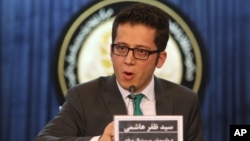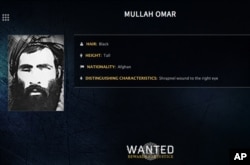Afghan government officials said Wednesday that reclusive Taliban chief Mullah Omar is dead, and that he died more than two years ago in Pakistan.
A government statement said the findings were based on "credible information."
"He was very sick in a Karachi hospital and died suspiciously there," said Abdul Hassib Seddiqi, spokesman for Afghanistan's main intelligence agency, the National Directorate of Security.
He did not explain what was suspicious about the death, or say how long his agency had possessed information about Omar's fate.
President Ashraf Ghani's office also said Omar died in 2013, but the Taliban itself claimed that Omar is still alive.
In Washington, the White House said the reports of Omar's death appeared credible and that U.S. intelligence authorities are looking into the circumstances of his death.
Unclear why news now emerging
It was unclear why news of his death was just now emerging, although there have been other reports of his death since 2001.
That was the last time the one-eyed secretive head of the Taliban and an al-Qaida ally had been seen in public after U.S.-led forces toppled his government and he fled over the Afghan border into Pakistan.
The death of Mullah Omar, a close ally of the al-Qaida terror network, could complicate or even scuttle a second round of peace talks set to begin Friday between the Taliban and the Afghan government.
President Ghani's office said the attempt to end the long conflict over control of Afghanistan should go on.
A statement said: "The government of Afghanistan believes that grounds for the Afghan peace talks are more paved now than before, and thus calls on all armed opposition groups to seize the opportunity and join the peace process."
Omar's death could lead to a power struggle within the insurgent group, which is considered to be a loose group of separate factions.
Reports say possible successors to Omar include the Taliban's current deputy leader, Mullah Mansour, and Omar's son, Mohammad Yakoub.
Reject claims
Even after Wednesday's report from the president's office, a Taliban spokesman insisted to VOA that Mullah Omar was still alive. That comment was seen as an attempt to deflect any announcement that might upset the negotiations.
Before Afghan officials clarified Omar's fate, the Afghan Taliban had rejected reports that the fugitive extremist leader was already dead.
Month after month, the Taliban had issued statements in Mullah Omar's name that claimed battlefield gains for the group's fighters.
Mullah Omar had made no public appearances or presented direct evidence he is alive in at least five years. Previous reports of his death that appeared in news media in the region had never gained wide circulation.
The most recent Taliban message said to be from Mullah Omar, distributed earlier this month, endorsed the Afghan peace talks as “legitimate” in terms of Islamic principles.
The reclusive cleric was quoted as saying he would not oppose peaceful negotiations if they could help end “U.S.-led foreign occupation” of Afghanistan and establish an Islamic system of government in the country.
Sheltered bin Laden
Mullah Omar led the Taliban when U.S. forces invaded Afghanistan in 2001 after the September 11 terrorist attacks against the United States.
The Taliban supported al-Qaida and sheltered its leader at the time, Osama bin Laden, who took credit for planning the attack by hijacked airliners that killed nearly 3,000 people in the U.S.
In the aftermath of the 2001 attacks, the U.S. government offered large rewards for the capture of many al-Qaida and Taliban leaders. A $10 million bounty was offered for Mullah Omar.
The U.S. State Department took a cautious view of the news that Omar died more than two years ago. "We have seen the reports," a spokesman told VOA, "and are looking into their viability."
Omar had been the supreme commander and spiritual leader of Afghanistan since 1996. After fleeing into Pakistan, he dropped out of sight after the U.S. invasion that followed the 2001 attacks on New York and Washington.
Ken Bredemeier in Washington contributed to this report.

